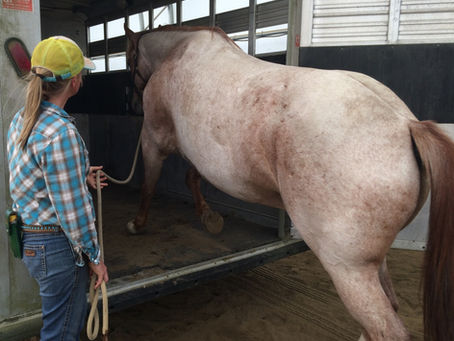top of page
Horse behaviour blog posts
Search


Horse afraid of injections? This effective approach comes with (positive) side effects
Most horse training and behaviour change techniques come with side effects. Are you prepared for them?
Lauren Fraser, MSc, FFCP
Jun 19, 20251 min read


'Scared Horses are Pretty Horses'
Misunderstood images of stressed or frightened 'pretty' horses aren't a new, social media phenomenon. But they are a problem.
Lauren Fraser, MSc, FFCP
Oct 27, 20203 min read


Classical Conditioning & Horses
All animals, including humans and horses, respond to the same powerful principles of learning. One of these principles, classical...
Lauren Fraser, MSc, FFCP
Jul 2, 20202 min read


Triage Advice: Punishment & Horse Behaviour Problems
I see horses for a variety of behaviour problems, such as aggressive behaviour, general anxiety, specific fears about various things or...
Lauren Fraser, MSc, FFCP
Jun 24, 20201 min read


Triage Advice: Aggressive Behaviour in Horses
Aggressive behaviour is a common complaint of horse owners. Aggression in horses may appear as threats such as ear pinning or kick or...
Lauren Fraser, MSc, FFCP
Jun 18, 20201 min read


Your Horse's Trust Bank Account
When you train your horse, are you making deposits in the trust bank account, or are you making withdrawals? Many horses I see have trust...
Lauren Fraser, MSc, FFCP
Jun 6, 20203 min read


Triage Advice: Horse is Mouthy When Haltered
A common complaint from horse owners is that their horse is mouthy when haltered. The horse mouths or nips them, or the halter or...
Lauren Fraser, MSc, FFCP
May 28, 20202 min read


Your Horse's Eating:Fasting Pyramid
Did you know that doing a little basic math can result in profound changes for your horse's behavioural and physical health? Horses are...
Lauren Fraser, MSc, FFCP
May 27, 20204 min read


Your Horse Needs to Learn to Yield to Pressure
As I type this, I am on evacuation alert at home due to a wildfire burning, uncontained, 2 km south of my home in our remote community....
Lauren Fraser, MSc, FFCP
Apr 17, 20203 min read


Behavioural Injuries in Horses
Horse owners are all too aware of how a physical injury can temporarily sideline - or even permanently lame - their horse. This knowledge...
Lauren Fraser, MSc, FFCP
Mar 6, 20204 min read


Shaping Plans 101: The Best Training Tool
A shaping plan puts to paper exactly what steps you will take to teach a horse a new, wanted behaviour. Taking a few minutes to write a...
Lauren Fraser, CHBC
Jun 25, 20191 min read


Girth or Cinch Tightness: Two Places to Always Check
Most people only check in one location on the horse's body when determining the tightness of a girth or cinch - just above the horse's...
Lauren Fraser, MSc, FFCP
Jun 15, 20191 min read


Trailer Loading: Recognizing Thresholds, Building Confidence
Almost every interaction we have with a horse affects their confidence. No matter our horse training goals, this confidence - in...
Lauren Fraser, CHBC
Jun 7, 20193 min read


Start Buttons and Horse Training
What's a start button, and why should it be part of your horse training? A start button is a way for an animal to give consent to...
Lauren Fraser, CHBC
May 23, 20192 min read


'You can't train a behaviour at the time that you need it.'
While technically you can sometimes train a behaviour when you need it, there may be unwanted consequences to taking this approach. What sho
Lauren Fraser, CHBC
Sep 1, 20183 min read


Behavioural Euthanasia of the Horse
What do veterinarians need to know about behavioural euthanasia of the horse?
Lauren Fraser, MSc, FFCP
Jun 12, 20185 min read


'Allow the Horse to Make the Mistake'
One Myth, Three Facts, & A Confession About Fixing Behavior Problems in Horses Myth: If you don't allow the horse to make the mistake he...
Lauren Fraser, MSc, FFCP
Jul 12, 20174 min read


Factors That Affect Sleep Quality in Horses
"Sleep is one of the most relevant behaviors for biological functioning." All animals must sleep. Sleep deprivation in horses...
Lauren Fraser, CHBC
May 28, 20173 min read
bottom of page
